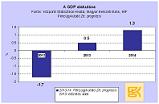| Contact |  |
 |
You are here
Home ›Privatization as a ?Learning Process?: The Case of Hungary
Hungarian privatization is considered as a process which has been dominated by standard methods. Most of the firms were sold via public tenders, private placement or public offerings and state budget generated significant cash income from selling. A detailed analysis, however shows that the course of privatization has neither been direct nor uniform even in this country. Every conceivable approach occurred on the scene during the last decade, including free distribution to individuals and institutions or preferences to different types of buyers as well as loosely controlled movements and centralized governmental decisions.
The intention of this paper is to show some reasons behind these fluctuations. Privatization is regarded here as a learning process. Learning process not in a technical sense but rather a trial and error approach, an adjustment of all main actors (governments, enterprise management and potential new owners) led partially by constraints, partially by changing opportunities.
In: Successful Transitions, Political Factors of Progress in Post-socialist Countries, Jürgen Beyer, Jan Wielgohs, Helmut Wiesenthal eds., Nomos Verlagsgesellschaft, Baden-Baden 2001. 139-152.
| Attachment | Size |
|---|---|
| 162.87 KB |
Financial Research Plc.
IKU Innovation Research Centre
News and events
Working Paper Series
-
11/26/2011 - 15:38
-
11/25/2011 - 16:00
-
11/18/2011 - 20:00
-
08/20/2011 - 15:31
-
07/18/2011 - 19:53



